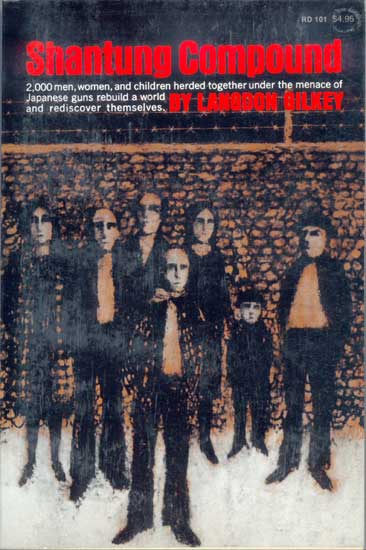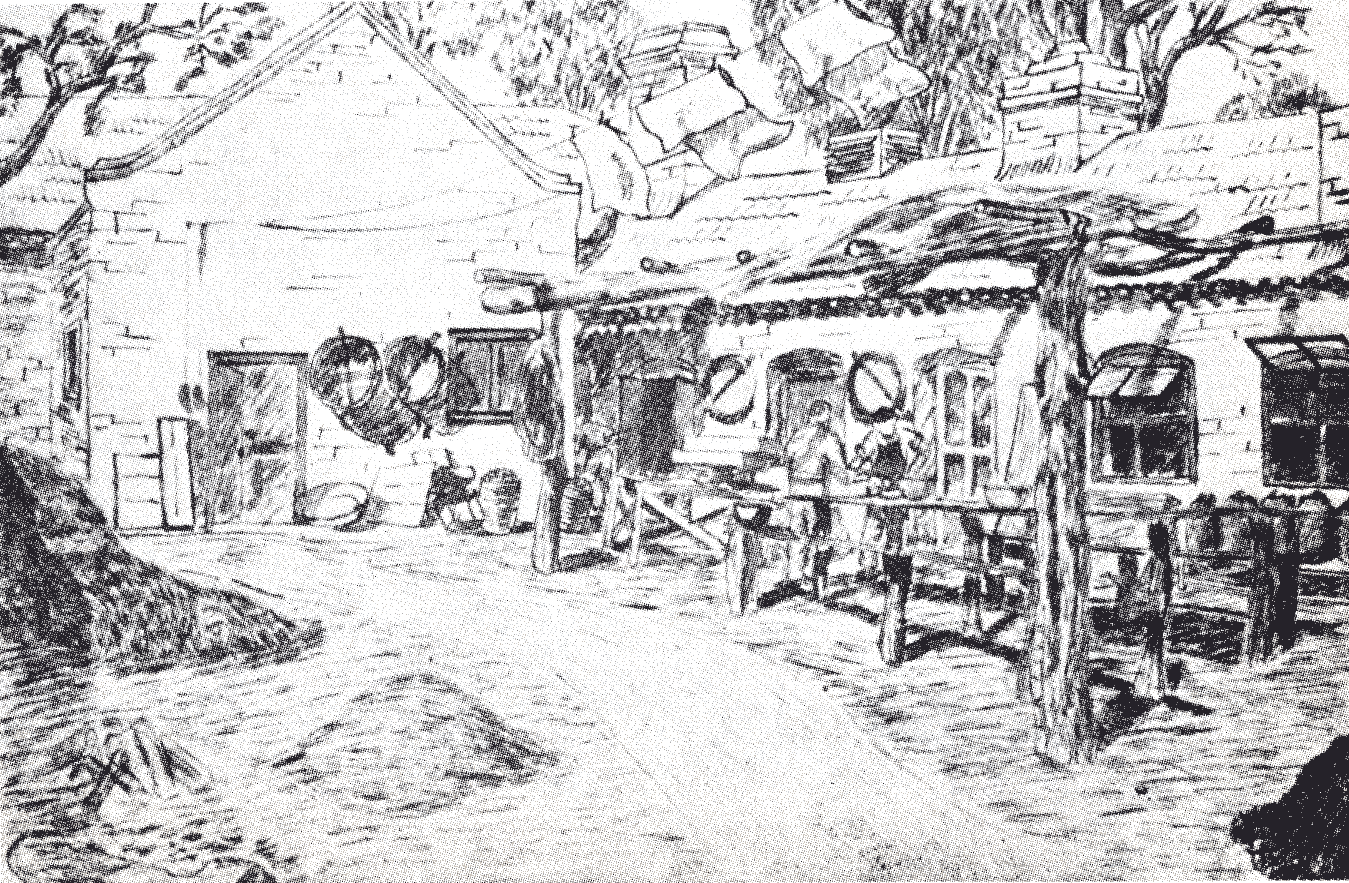
- by Langdon Gilkey
[Excerpts] ...
[...]

 ooking food and boiling water, however, required heat. For this purpose, coal and wood were brought to the kitchen yard from the supply house in carts. In our yard two men were always chopping wood while others molded bricks out of the coal dust that made up most of our usual coal issue. Two stokers got up the fires and tended them, one in the cooking area and the other where water was boiled for drinking. Stoking was a job which called for great skill since the coal was poor and the cooks extremely demanding about the level of heat they had to have under their precious stews.
ooking food and boiling water, however, required heat. For this purpose, coal and wood were brought to the kitchen yard from the supply house in carts. In our yard two men were always chopping wood while others molded bricks out of the coal dust that made up most of our usual coal issue. Two stokers got up the fires and tended them, one in the cooking area and the other where water was boiled for drinking. Stoking was a job which called for great skill since the coal was poor and the cooks extremely demanding about the level of heat they had to have under their precious stews.
[excerpts] ...
By the beginning of the winter of 1944-1945, food from the parcels had long since vanished, and the cuts in our supplies were growing ever more drastic. Winter on the plains of North China is biting cold— such as one might expect in Detroit or Chicago. We were issued very little coal dust with which to heat our rooms. Morale in the camp was at its all-time low. The future stretched on as endless and dreary as the snow-covered flatlands beyond the barbed wire on the walls of the compound.
One of the stokers in the kitchen was a former official in a Far Eastern shipping line, a rather high-class type with a good education. Shortly after the law went into effect, he was caught taking home buckets of lump coal (rather than the coke made by his fires) from the kitchen yard.
At his trial he defended himself by maintaining that his act was not stealing, but the common “perk” for his stoking job. Thus, said he, what he did was merely something that every stoker did by common practice and so his case was no different in kind from tens of others. Consequently, he continued, while he recognized that “perks” were now against the law, he demanded that every stoker in camp stand with him in the dock, or else he would claim that he was being tried unfairly. His sharp defence—one could see the advantage of a trained mind—put the court in a tough spot, as it was calculated to do. The Discipline Committee had no intention of prosecuting all the other stokers whom they knew were continuing to take home “mild perks” as usual. What the committee wished to prosecute was stealing, and the members were certain that what this man had been doing was just that. They had, however, to acquit him, for they could not define legally the subtle but important difference between a normal “perk” and stealing so long as the law regarded both as crimes. What was needed was a legal definition of a legitimate “perk” so that anything beyond that could be effectively prosecuted. The mistake had been to seek to abolish an accepted pattern of the community’s life—rather than to control it within reasonable bounds. Shortly after the conclusion of this case, another man was caught taking raw supplies home from the kitchen. When he, too, claimed that this was his rightful “perk” and that he was then “no different from any other kitchen worker and so could not be prosecuted unless they all are — this mistake in the law became plain to everyone. As we all knew, “perks” had not ceased because of the law against them. On the contrary, all that had occurred by the promulgation of an idealistic law was the removal of the law from its relevance to the social scene—and that was a serious matter. For then, practices which the community would not accept were legally identifiable with continuing practices that it did accept, and so the law became incapable of coping with precisely those actions it was designed to prevent.

Community morale is a vague, irrational matter of atmosphere and moral tone—not a matter of logic. It would seem that once a basic moral standard is flouted in one area it is difficult for standards to be upheld in some other area. I was made aware of this tone of unlawfulness when, as manager, I heard a stoker on the boiler side say to a friend as he was putting his coke “perk” into his bucket to go home for the night, “These committeemen and that damn manager says we shouldn’t take home lump coal — do they? Well, every one of those bloody committeemen have stolen stovepipes in their rooms—stolen from the same bloody Nips. Why is the coal I take home so different, except that I’m not a pukka big shot! Probably old man Campbell is well supplied with coal anyway—the stoker on No. 2 boiler lives right next door to him—the very one who got Campbell his extra stovepipes!”
One night a middle-aged woman, an Anglican missionary, saw John and Willie taking lump coal from the supply pile. She reported this at once to the Discipline Committee. The lawyers in the camp had devised for us an intricate judicial system. Now began its first real testing.
The day after reporting the case, the woman duly accused Chamberlain and Bryan before the Discipline Committee. At that meeting the two of them offered as a defence the justifications, we all knew so well:
(1) Coal was the recognized “perk” of the supplies gang. If they were to be convicted, the entire laboring force should be similarly treated, although it was pointed out by a committee member that lump coal taken at night hardly counted as a “perk”.
(2) They were actually helping the Allied war effort since the Japanese would have to replace the coal from their own supplies.
They felt, as Willie sardonically remarked, that they should be feted, not punished, by the camp for having risked their skins to relieve the Japanese of some of their coal! In spite of these arguments, the committee agreed that a case had been made against them, and that the trial would start the next day.
[further reading] ...

http://weihsien-paintings.org/books/Gilkey/p_Gilkey.htm
#








